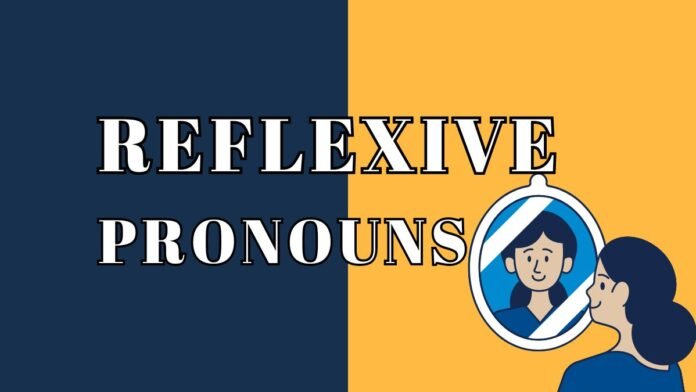Reflexive pronouns are pronouns that refer back to the subject of the sentence. They reflect the action of the verb back onto the doer. In English, the reflexive pronouns are myself, yourself, himself, herself, itself, ourselves, yourselves, and themselves.
What are reflexive pronouns?
Reflexive pronouns are words that finish with either -self (singular) or -selves (plural). They are used when a sentence’s subject and object are the same.
| Personal pronouns | Reflexive Pronouns |
| I | Myself |
| You (singular) | Yourself |
| He | Himself |
| She | Herself |
| It | Itself |
| We | Ourselves |
| You (plural) | Yourselves |
| They | Themselves |
Examples of reflexive pronouns
Tom thinks of himself
I did the exercise myself. No one helped me.
Bob and Quinn blamed themselves for the accident.
Notice:
Reflexive pronouns are not used after verbs like feel, relax, concentrate, or meet.
Tom is upset; he can’t relax (not relax himself)
I need to concentrate (not concentrate myself)
Ten examples of reflexive pronouns
Here are ten examples of reflexive pronouns in sentences:
- I hurt myself when I fell off the bike.
- You should be proud of yourself for finishing the project on time.
- He talked to himself while he was walking down the street.
- She gave herself a pat on the back for acing the exam.
- The cat licked itself clean after eating its dinner.
- We enjoyed ourselves at the concert last night.
- You need to take care of yourselves by eating healthy and exercising regularly.
- They congratulated themselves on a job well done.
- She bought herself a new dress for the party.
- He reminded himself to call his mother later.
Usage of Reflexive Pronouns
Reflexive pronouns are used in various situations.
Emphasizing the subject: “I myself witnessed the incident.”
Referring back to the subject: “She cut herself while cooking.”
Expressing a sense of ownership: “He built the house himself.”
Indicating an action performed alone: “She enjoyed a peaceful evening by herself.”



